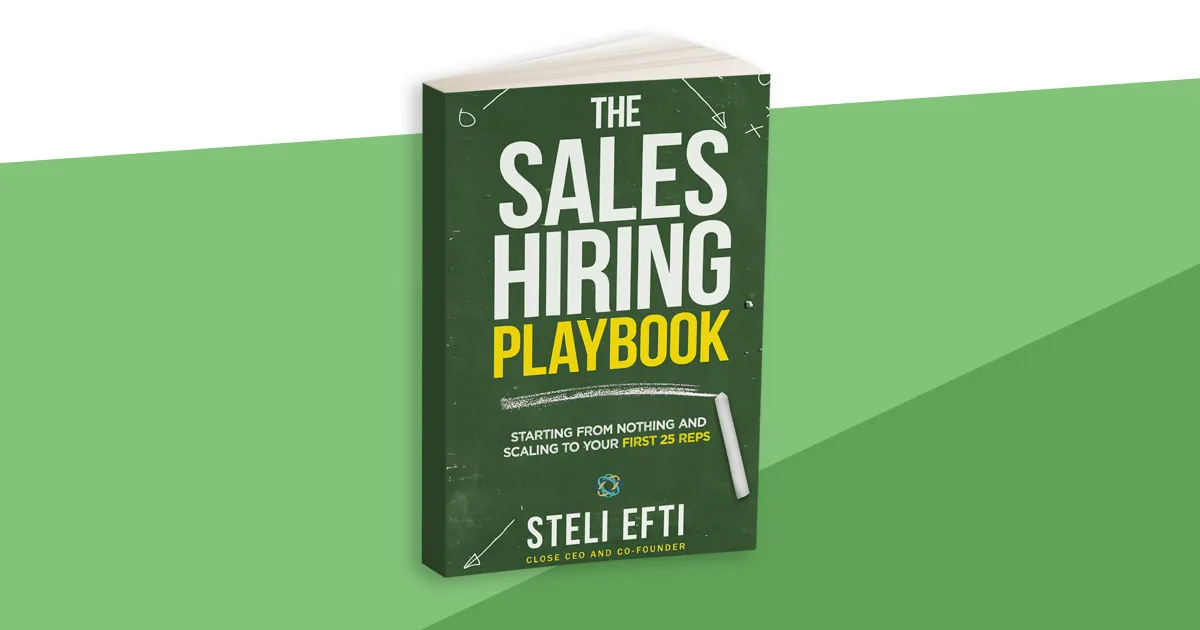
“Sell me this pen.”
Unless you’re running the sales team for a company that literally sells pens, this question isn’t going to help you find the best sales rep.
Here’s the thing:
That pen might cost $5—and that’s only if you like to carry high-quality pens.
The buying process for a $5 pen is going to be a lot different than the buying process for enterprise software, retainer work for an agency, or just about anything that comes with a hefty price tag.
And because of that, the selling process is also going to look a lot different.
Sure, the candidate you interview might have an amazing response to the pen question (which they almost definitely rehearsed in advance)—does that mean they’re a master salesperson you should hire on the spot?
Only in the movies, my friend. This ain’t Wolf of Wall Street.
Let’s get back to reality.
In this post, I’m going to suggest a handful of sales interview questions you can ask during a sales interview to make sure you hire the right people from the jump.
But first, I want to share two important sales recruitment / prospecting ideas with you.
1. Watch them play
If you want to find out if someone is a great basketball player, do you…
- Ask them a bunch of well-planned questions about how to play basketball
- Watch them actually play basketball
You’re going to learn an awful lot more about their abilities from option B.
Great example: Kawhi Leonard.
He’s a quiet guy. He doesn’t usually say too much on the court, his interviews are brief, he keeps his circle small—he’s just a reserved and humble dude.
But on the court, he’s a machine.
The same idea applies to sales interviews.
Some people are amazing at interviews. They were born ready to talk about their strengths, weaknesses, past successes and future goals.
And some people may freeze up if you stump them on a product questions or tool they’re not entirely familiar with.
Does that mean one person is destined to be great at sales while the other one should hide behind a computer screen and never talk to a prospect?
Not exactly.
If a candidate is reserved or awkward in interviews, but has an amazing background as a sales leader who can inspire others to crush it—you don’t want to miss out just because they couldn’t answer every question perfectly.
So how can you “watch them play” in a sales interview?
You give them a few sales assignments like a mock sales call. Brief them on your product and then try to get them to sell to you in a mock sales call.
Which leads us into my second idea:
2. Don’t make a decision on day one
 |
A 20-minute tryout could tell you something about a basketball player’s talent...but it won’t tell you everything. How’s their stamina? Are they consistent? Can they get the job done under different kinds of pressure?
Sometimes players have off-days...and sometimes they play out of their minds.
The same thing goes for sales interviews.
- It’s not enough to only interview them
- It’s also not enough to watch them once and assume you know everything
If a candidate can talk the talk and walk the walk, the last thing you need to figure out is whether they can keep it up. A sales rep that’s a superstar one day a week and sub-par the rest isn’t going to move the needle as much as you want.
Set up a trial phase before they’re officially hired.
Pay them for their time, and give them a chance to prove they have what it takes for more than a single dry run.
And with both of these ideas in mind—let’s talk about the interview itself.
Questions to ask candidates during sales interviews (that’ll actually tell you something)
While you definitely shouldn’t base your entire hiring decision on the interview alone, it is still a great chance for you to learn about candidates and how they think.
Here are five of my favorite questions to ask in every sales interview:
1. Why are you into sales?
This is the most important question you can ask in the entire interview.
Motivation is everything in the sales world. You need to understand what motivates them to succeed in sales, and consider how well it aligns with the overall goals of the company.
2. Why do you want to sell this product?
This’ll also give you an idea of their motivations behind applying for the job.
Are they genuinely interested in selling what your company is offering, or are they just looking for any sales job they can find to secure a paycheck?
If it’s the latter, that doesn’t necessarily mean they don’t have the potential to become a great salesperson on your team—but the person who’s excited to sell your product is likely going to be a better fit.
3. How much do you know about who we’re selling to?
Do they already have experience in your industry, and how much homework have they done? That’s what you’ll learn from this question.
If they’ve already worked in sales in your market before, that’s a great sign. The learning curve will be a lot less intensive. And if they’ve put in the work to understand your audience, that speaks volumes about their dedication and willingness to work hard.
4. Tell me about a time you were really stressed out—how did you deal with it?
Sales can be stressful—there’s no denying that.
As months and quarters come to an end, quotas and targets can lead to a lot of stress for sales reps.
The same goes for a cold streak, when a rep gets back-to-back-to-back no’s for what seems like forever.
What do they do when the stress builds up?
5. What’s the last sales tactic or strategy you learned?
If the candidate is seriously committed to mastering their craft, this question will be a breeze. They’ll be able to go on and on about what they’ve been reading and following in the sales world.
But the candidate who thinks they’re good enough already? This is where you catch them.
If they aren’t staying up to date on what’s working in 2020 and how the landscape is changing, that’s a major red flag—if they aren’t doing it now, what makes you think that’ll change when they get the job?
Over to you
Don’t rely on “sell me this pen” gimmicks to find great salespeople. Your chances of hiring high-performing sales reps will go way up when you start asking the right questions and structuring the entire hiring process so that you can see candidates in action.
Here are the two important lessons you need to keep in mind when hiring sales reps:
- Don’t rely solely on the interview—watch them play as well
- Consistency is key—give them a chance to prove they can deliver day in, day out
And here are my five favorite interview questions to ask:
- Why are you into sales?
- Why do you want to sell this product?
- How much do you know about who we’re selling to?
- Tell me about a time you were really stressed out—how did you deal with it?
- What’s the last sales tactic or strategy you learned?
Looking for some more guidance when it comes to hiring your first 25 sales reps?
 |
Download our free Sales Hiring Playbook to get step-by-step walkthroughs on how you can recruit, interview and hire the best candidates.
As a bonus, the Sales Hiring Playbook also has an hourly schedule for fully onboarding sales reps in just four weeks. Follow the steps, and your sales reps will be running full speed ahead by month two.










